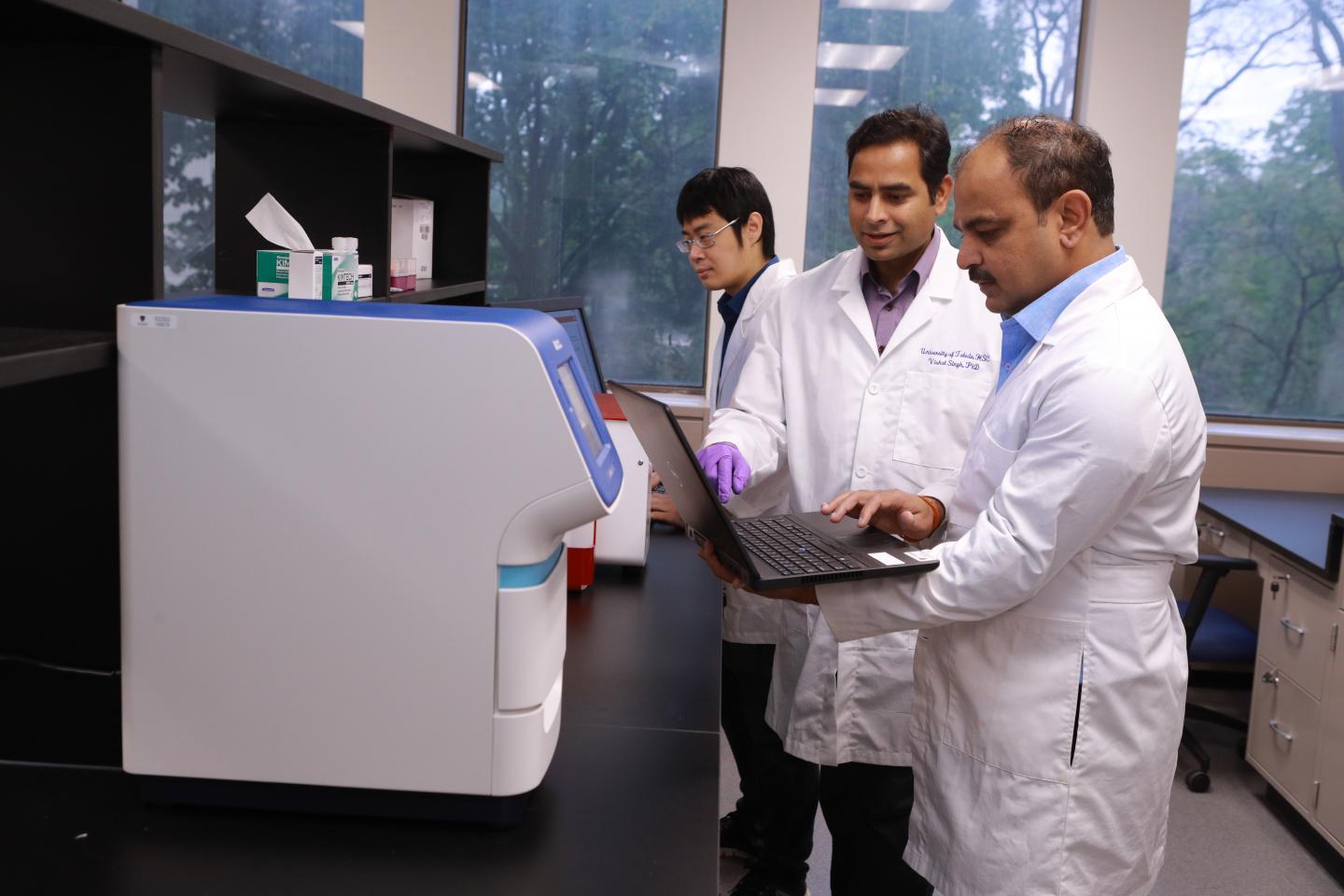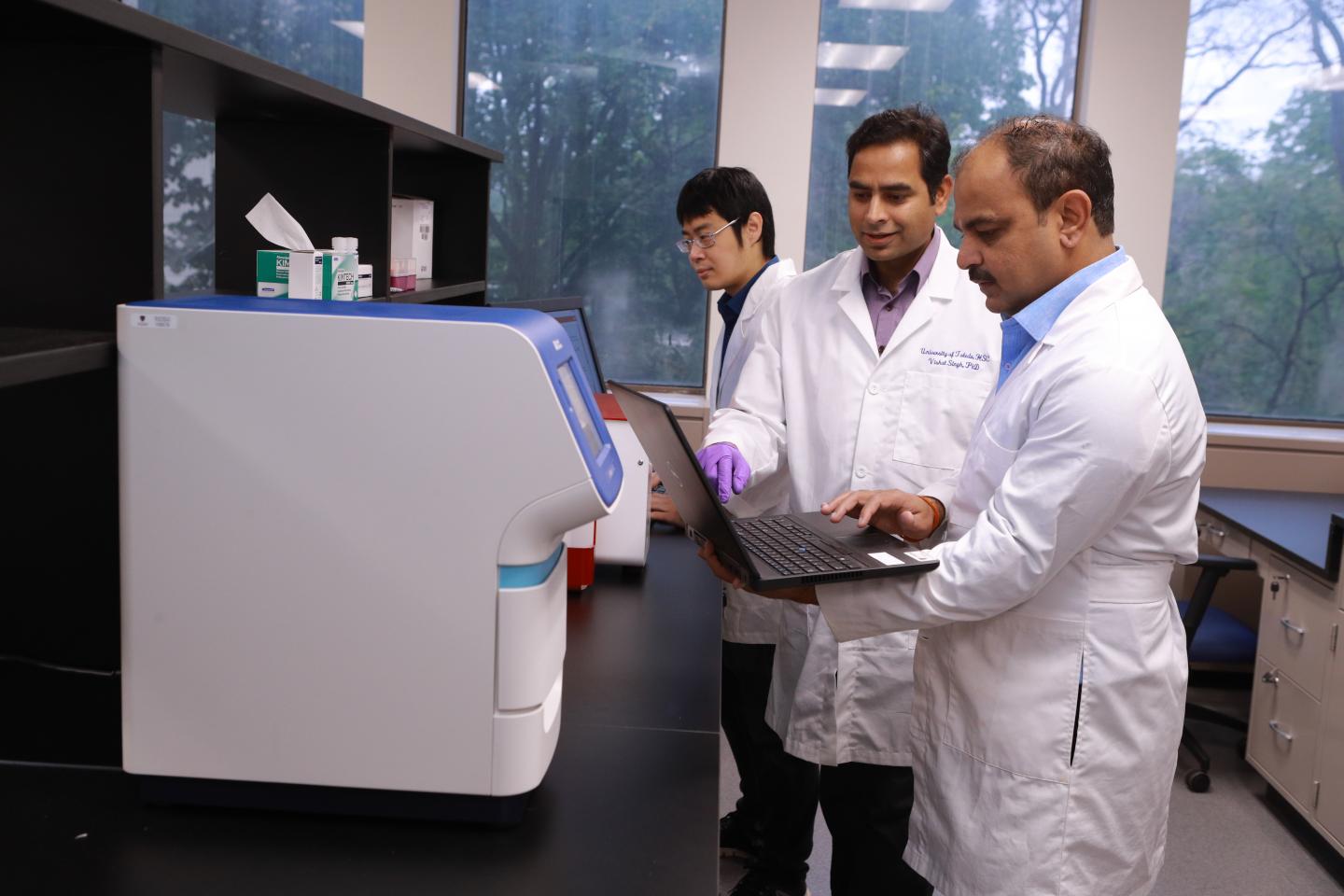
Credit: Dan Miller, University of Toledo
Many of the processed foods we find on grocery store shelves have been loaded up with highly refined soluble fibers such as inulin, a popular probiotic that recently received approval from the Food and Drug Administration to be marketed as health-promoting.
But a new study from The University of Toledo's College of Medicine and Life Sciences is raising serious questions about whether the risks of adding refined fiber to processed foods may significantly outweigh the benefits.
Dr. Matam Vijay-Kumar, director of the UT Microbiome Consortium and associate professor in the UT Department of Physiology and Pharmacology, and his research team recently investigated if a diet enriched with refined inulin might help combat obesity-associated complications in mice.
While the inulin-containing diet did stave off obesity in 40 percent of mice, many of those same mice went on to develop liver cancer at the end of the six-month study.
"The findings shook us," Vijay-Kumar said, "but at the same time we recognized their potential importance and accepted the challenge of exploring how processed dietary soluble fiber was inducing liver cancer."
Although this study was performed in mice, it has potential implications for human health. It also suggests, researchers say, that enriching processed foods with refined, fermentable fiber should be approached with great caution.
"We fully appreciate that the fibers present in whole foods like fruits and vegetables are healthy," Vijay-Kumar said. "Because of that, fortifying or adding purified fiber to processed food sounds logical. However, our results suggest it may in fact be dangerous."
The findings were published in the Oct. 18 issue of Cell, one of the world's leading biological journals.
There are two basic types of naturally occurring dietary fiber, soluble and insoluble. Soluble fibers are fermented by gut bacteria into short-chain fatty acids. Insoluble fibers pass through the digestive system unchanged.
While both types are beneficial, the concern raised in the study relates to how gut bacteria break down the highly refined fiber that is added to some processed foods as a dietary supplement.
Dr. Vishal Singh, a Crohn's and Colitis Foundation Fellow at The University of Toledo and lead author of the paper, said refined fiber is a new addition to our diets and that we are in the very early stages of understanding the risks and benefits it may present.
"Soluble fibers added to processed foods are not part of a natural meal," Singh said. "The inulin used in this study is from chicory root, which is not a food we would normally eat. In addition, during the extraction and processing of the fiber, it goes through a chemical process. We don't know how the body responds to these processed fibers."
Chicory root is used as a source of inulin to fortify fiber in processed foods.
The mice that developed liver cancer in this study had altered and elevated gut bacteria, a condition known as dysbiosis. Intriguingly, the researchers observed no evidence of liver cancer in inulin-fed mice that were treated with broad-spectrum antibiotics to deplete gut bacteria.
The UT researchers collaborated with researchers at Georgia State University who performed a similar study in germ-free mice that completely lack gut bacteria. The absence of liver cancer in those mice further confirmed the contributory role of gut bacteria.
The bacteria collectively known as gut microbiota degrade and digest soluble fibers via fermentation. To inhibit that fermentation process, the UT researchers fed mice beta acids derived from Humulus lupulus — a plant more commonly known for producing the hops that go into beer to prevent spoilage from fermentation.
"Strikingly, feeding beta-acids to inulin-fed mice averted liver cancer, which further reinforces our hypothesis that gut bacterial dysmetabolism primarily driving liver cancer in these mice," Singh said.
Researchers also found they could halt the development of liver cancer by intervening to replace inulin with the insoluble fiber cellulose.
"Cellulose could not be fermented by gut bacteria present in mice or humans. This finding again highlights the link between bacterial fermentation of soluble fiber and liver cancer development in these mice," said Beng San Yeoh, a graduate student in Vijay-Kumar's lab and another lead author of the study.
Researchers say their findings suggest the need for more studies that look at human consumption of the type of refined fiber found in processed foods.
"Our study is going against the conventional wisdom of what people think, that fiber is good, no matter how they get it," Vijay-Kumar said. "We do not want to promote that fiber is bad. Rather, we highlight that fortifying processed foods with refined soluble fiber may not be safe or advisable to certain individuals with gut bacterial overgrowth or dysbiosis, whose abnormal fermentation of this fiber could increase the susceptibly to liver cancer."
###
The study was supported by the National Cancer Institute of the National Institute of Health.
Media Contact
Tyrel Linkhorn
[email protected]
419-383-5376
http://www.utoledo.edu
Related Journal Article
http://dx.doi.org/10.1016/j.cell.2018.09.004





